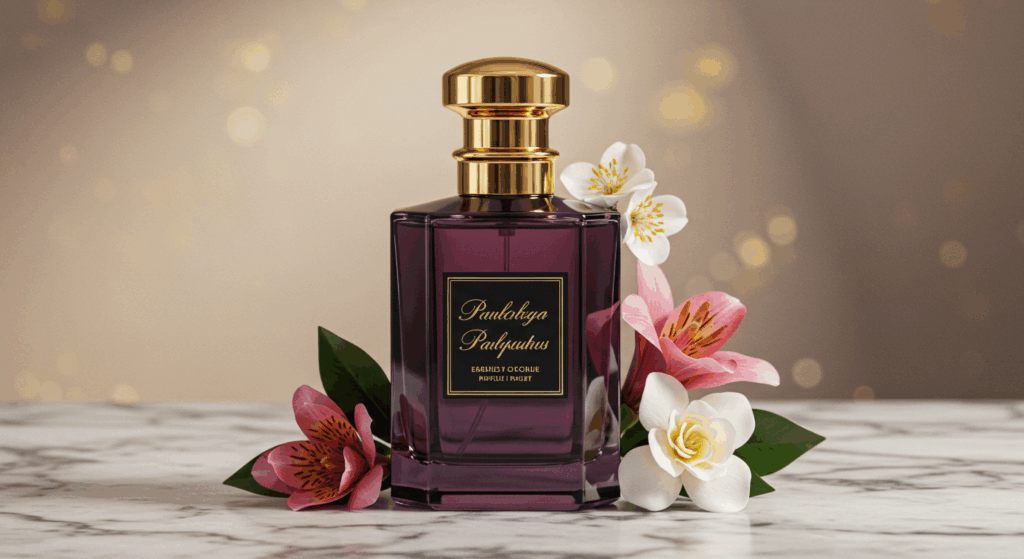Table of Contents
Have you ever tried on a perfume your friend raved about, only to discover it smells completely different on your skin? Frustrating, right? You’re not imagining things. Perfumes can smell different from one person to another because of their unique skin chemistry.
Perfumes are intricate works of art, crafted from a blend of essential oils, aroma compounds, and synthetic notes. But how they interact with your skin depends on a variety of factors, from pH levels to hormones, and even the environment.
This guide dives deep into the fascinating science behind why perfume smells different on skin, helping beginner fragrance enthusiasts and scent-curious individuals make informed choices when selecting their signature scent.
The Basics of Perfume Composition
Understanding why perfume smells different starts with understanding how perfumes are created. Think of each fragrance as a tale told in three parts:
The Structure of Perfume
- Top Notes:
These are the initial scents you detect immediately after spraying a perfume. They’re typically light, fresh, and fleeting. Think citrus, herbs, or delicate florals.
- Middle Notes (Heart Notes):
These emerge after the top notes fade, lasting longer (anywhere from 20-60 minutes). Middle notes often include florals like rose, jasmine, and lavender, or spices such as cinnamon and clove.

- Base Notes:
The foundation of a fragrance lies in its base notes, which anchor the perfume and create lasting impressions. Common base notes are musk perfume, vanilla, sandalwood essential oil, and amber.
Ingredients That Create a Scent Profile
Perfume ingredients are complex, combining:
- Essential Oils for Perfume (e.g., lavender, rose, and bergamot)
- Aroma Compounds (like aldehydes to elevate scents)
- Synthetic Fragrances (created to mimic rare or expensive natural ingredients)
These components interact differently with your skin, which explains why every scent is unique to the person wearing it.
The Science of Skin Chemistry
Skin pH
Your skin’s pH levels—which range from 4.5 to 5.5 on average—play a crucial role in how a fragrance unfolds. Acidic skin can brighten certain “sharp” notes like citrus or green scents, while alkaline skin may enhance warmer accords like amber or musk.
Skin Oils (Sebum)
Sebum, or the natural oil your skin produces, acts as a medium for perfume molecules. Oily skin amplifies stronger base notes like sandalwood oil benefits or white musk, while drier skin might make fragrances fade faster, leaving lighter top notes to shine.
Skin Hydration
Well-hydrated skin holds fragrance better, allowing it to last longer. If your skin leans toward dryness, applying an oil fragrance or unscented lotion before spraying can improve the scent’s projection and longevity.
Your Body’s Natural Odor
Each individual has a distinct body scent impacted by bacteria living on the skin and diet. This unique “background note” alters how the fragrance profile comes across on you versus others.
Factors That Affect Perfume Scent
1. Diet
What you eat has a surprising impact on how your perfume smells.
- Foods like garlic, onion, or spices can linger in your body odor and shift how your fragrance interacts with your skin.
- Conversely, a diet rich in fresh fruits and vegetables tends to produce fresher, subtler body chemistry.
2. Medications
Medications and supplements can influence body odor or skin pH. For instance:
- Hormonal medications might heighten certain sweeter notes.
- Medicines impacting sweat production can dull a fragrance’s overall intensity.
3. Environment
Climate and surroundings dramatically change a perfume’s behavior.
- Warm Weather: Heat intensifies perfumes, making citrus and lighter floral scents suitable for summer.
- Cold Weather: Cooler temperatures slow fragrance evaporation, leaving richer notes like amber and sandalwood to shine.
- Pollution: Urban air quality can interact with delicate perfume top notes, reducing their brightness.
4. Hormones
Hormonal fluctuations (due to menstruation, pregnancy, or stress) alter skin’s oil production and pH, transforming how a fragrance behaves. This is particularly relevant when exploring women’s fragrance oils or musk perfume selections.
5. Stress
Your body’s response to stress can change its natural odor, affecting how perfume melds with your skin. Elevated cortisol levels, for instance, may make certain fragrances appear sharper or cloying.
The Role of the Skin Microbiome
Another overlooked yet crucial element is the skin microbiome, a bustling ecosystem of bacteria, fungi, and other microorganisms living on your skin.
- Microbiome Diversity: The unique composition of your skin microbiome can make sweet notes stand out more for one person, while woody notes may dominate someone else’s scent profile.
- Impact of Skin Products: Frequent use of antibacterial washes or certain skincare products can disrupt your microbiome, altering how perfumes unfold on your skin.
Regular use of natural products like sandalwood essential oil or women’s fragrance oils, which are gentle on the skin, might help preserve your microbiome’s balance.
Practical Tips for Choosing Perfume
1. Test Perfume on Your Skin
Never judge a perfume solely based on how it smells on a test strip. Apply it to your pulse points, like wrists or neck, and wait for it to dry down to experience its full profile.
2. Know Your Skin Type
- Oily skin? Opt for lighter scents, as your skin naturally extends their longevity.
- Dry skin? Choose perfumes with richer base notes (like amber, musk perfume, or sandalwood essential oil) and layer over an oil fragrance to lock them in.
3. Consider the Environment
Match perfumes to their occasion or season:
- Warm Weather: Go for clean, fresh, and crisp scents like citrus or green perfumes.
- Cool Weather: Opt for comforting, luxe fragrances like vanilla or white musk.
4. Take Time to Decide
Perfumes transform over hours. Wear the perfume for a full day to understand how it evolves and interacts with your skin.
5. Read Reviews and Consult Others
Online forums like Reddit offer discussions like “why perfume smells different on skin Reddit.” Blogs like Amiri also provide expert reviews and comparisons to guide fragrance lovers in picking a signature scent.
Explore the Depths of Scent with Confidence
Perfume is an art as much as it is a science. While you can’t control every factor that changes how fragrances smell on your skin, understanding the science allows you to better explore the endless array of scents available.
Start testing, experimenting, and learning! Who knows, your skin chemistry might just make a musk perfume or sandalwood essential oil the perfect match for your signature style.
FAQs
Q1. Why does my perfume smell different than the sample?
Samples are often applied to blotters, which don’t react with skin chemistry. Testing directly on your skin reveals the truest scent.
Q2. Why does perfume smell bad on me?
Your unique skin chemistry, diet, and hydration levels can make some perfume notes clash. Experiment with different ingredients until you find a match.
Q3. Does perfume change smell on skin?
Yes, perfume interacts with your skin’s natural oils, hydration levels, and pH, causing it to smell differently than it does in the bottle.
Q4. What are some perfume notes that last longer?
Base notes like musk perfume, amber, and sandalwood essential oil are long-lasting due to their molecular weight and slow evaporation rate.
Q5. Can stress and hormones affect how perfume smells?
Yes, stress and hormonal changes impact your natural body odor and skin’s oil production, indirectly altering how perfume smells on your skin.














Leave a comment